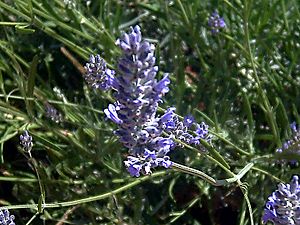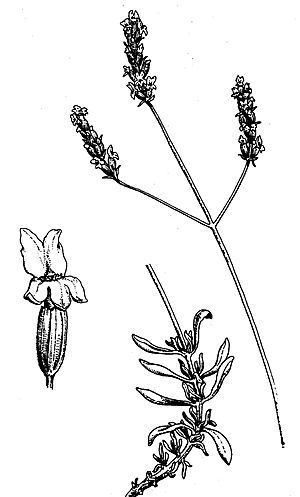Lavandula latifolia facts for kids
Quick facts for kids Lavandula latifoliaSpike lavender |
|
|---|---|
 |
|
| Scientific classification |
|
| Kingdom: | Plantae |
| Clade: | Tracheophytes |
| Clade: | Angiosperms |
| Clade: | Eudicots |
| Clade: | Asterids |
| Order: | Lamiales |
| Family: | Lamiaceae |
| Genus: | Lavandula |
| Species: |
L. latifolia
|
| Binomial name | |
| Lavandula latifolia Medik.
|
|
| Script error: The function "autoWithCaption" does not exist. | |
| Synonyms | |
|
|
Script error: No such module "Check for conflicting parameters".
Lavandula latifolia, also known as spike lavender or broadleaved lavender, is a beautiful flowering plant. It belongs to the Lamiaceae family, which includes many herbs. You can find it growing naturally in the western Mediterranean region, from Portugal across Spain and southern France to northern Italy. Sometimes, it can even mix with English lavender in the wild.
This lavender has a very strong smell, much more intense than other lavenders like English lavender. It smells a bit like camphor. Because of its strong scent, these two types of lavender are often grown in different fields.
Contents
About Spike Lavender
Spike lavender is a strongly scented shrub. It usually grows to be about 30 to 80 centimeters (about 1 to 2.5 feet) tall. Its leaves stay green all year round. They are typically 3 to 6 centimeters long and 5 to 8 millimeters wide.
Flowers and Fruit
The flowers of Lavandula latifolia are a light lilac color. They grow on spikes that are 2 to 5 centimeters long. These spikes are found at the top of thin, leafless stems, which can be 20 to 50 centimeters long. The plant usually flowers from June to September, depending on the weather.
After flowering, the plant produces small fruits. These fruits are like tiny nuts and often stay inside the flower's protective cup. Spike lavender can grow in many places, from sea level up to 1,700 meters (about 5,500 feet) high.
What's in a Name?
The name latifolia comes from Latin. It means "broadleaf," which describes the plant's wider leaves compared to other lavenders. The name Lavandula simply means lavender.
What's Inside Spike Lavender?
Spike lavender contains several natural chemicals that give it its strong smell and properties. Some of these include:
- Camphor: This gives it a strong, fresh, and slightly medicinal scent.
- Eucalyptol: Also found in eucalyptus, it adds to the fresh, clean smell.
- Linalool: This chemical is often found in many flowers and contributes to a pleasant, floral scent.
- Alpha-Pinene and Beta-Pinene: These are found in pine trees and give a fresh, pine-like aroma.
- Borneol
- Caryophyllene
- Camphene
- Guaiazulene
- Geraniol
- Limonene
How People Use Spike Lavender
Because of its unique scent and chemical makeup, Lavandula latifolia can be used in aromatherapy. This is a type of therapy that uses natural plant extracts to promote health and well-being.
See also
 In Spanish: Lavandula latifolia para niños
In Spanish: Lavandula latifolia para niños
 | Victor J. Glover |
 | Yvonne Cagle |
 | Jeanette Epps |
 | Bernard A. Harris Jr. |


